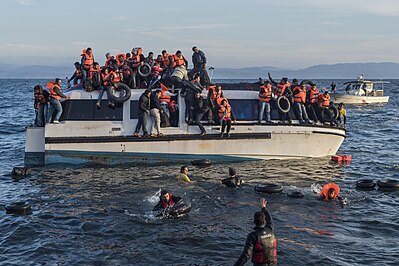Portal:European Union
Introduction
The European Union (EU) is a supranational political and economic union of 27 member states that are located primarily in Europe. The Union has a total area of 4,233,255 km2 (1,634,469 sq mi) and an estimated total population of over 448 million. The EU has often been described as a sui generis political entity (without precedent or comparison) combining the characteristics of both a federation and a confederation. Containing 5.8% of the world population in 2020, EU member states generated a nominal gross domestic product (GDP) of around US$16.6 trillion in 2022, constituting approximately one sixth of global nominal GDP. Additionally, all EU states except Bulgaria have a very high Human Development Index according to the United Nations Development Programme. Its cornerstone, the Customs Union, paved the way to establishing an internal single market based on standardised legal framework and legislation that applies in all member states in those matters, and only those matters, where the states have agreed to act as one. EU policies aim to ensure the free movement of people, goods, services and capital within the internal market; enact legislation in justice and home affairs; and maintain common policies on trade, agriculture, fisheries and regional development. Passport controls have been abolished for travel within the Schengen Area. The eurozone is a group composed of the 20 EU member states that have fully implemented the economic and monetary union and use the euro currency. Through the Common Foreign and Security Policy, the union has developed a role in external relations and defence. It maintains permanent diplomatic missions throughout the world and represents itself at the United Nations, the World Trade Organization, the G7 and the G20. Due to its global influence, the European Union has been described by some scholars as an emerging superpower. In 2012, the EU was awarded the Nobel Peace Prize. The United Kingdom became the only member state to leave the EU, in 2020; ten countries are aspiring or negotiating to join it. (Full article...) Selected article The euro (currency sign: €; currency code: EUR) is the official currency of the European Union (EU). Nineteen member states have adopted it, known collectively as the Eurozone (Austria, Belgium, Cyprus, Estonia, Finland, France, Germany, Greece, Ireland, Italy, Latvia, Lithuania, Luxembourg, Malta, the Netherlands, Portugal, Slovakia, Slovenia, Spain). The currency is also used in five further countries with formal agreements and six other countries without such agreements. Hence it is the single currency for over 320 million Europeans. Including areas using currencies pegged to the euro, the euro directly affects close to 500 million people worldwide. With more than €610 billion in circulation as of December 2006 (equivalent to US$802 billion at the exchange rates at the time), the euro is the currency with the highest combined value of cash in circulation in the world, having surpassed the U.S. dollar (USD). Taking official estimates of 2007 GDP, the Eurozone is the largest economy in the world by March 2008 after the USD/EUR exchange rate surpassed 1.56. The euro was introduced to world financial markets as an accounting currency in 1999 and launched as physical coins and banknotes on 1 January 2002. It replaced the former European Currency Unit (ECU) at a ratio of 1:1. The euro is managed and administered by the Frankfurt-based European Central Bank (ECB) and the Eurosystem (composed of the central banks of the euro zone countries). As an independent central bank, the ECB has sole authority to set monetary policy. The Eurosystem participates in the printing, minting and distribution of notes and coins in all member states, and the operation of the Eurozone payment systems. Selected picturePhotograph credit: Georgios Giannopoulos The European migrant crisis, also known as the refugee crisis, is a period beginning in 2015 characterised by high numbers of people arriving in the European Union from across the Mediterranean Sea or overland through Southeast Europe following Turkey's migrant crisis. It is part of a pattern of increased immigration to Europe from other continents, which began in the mid-20th century and which has encountered resistance in many European countries.
This picture shows Syrian and Iraqi refugees disembarking a boat upon reaching the coastal waters of the island of Lesbos, Greece, after having crossed the Mytilini Strait from Turkey. They are being assisted by volunteer lifeguards, in yellow and red clothes, from Proactiva Open Arms, a Spanish non-governmental organisation.
Did you know?...that Monaco, San Marino, and Vatican City all mint their own euro coins, with their own national symbols on the back, despite not being EU members? Selected cityAmsterdam, capital city of the Netherlands, lies on the banks of two bodies of water, the IJ bay and the Amstel river. Founded in the late 12th century as a small fishing village on the banks of the Amstel, it is now the largest city in the country and is a financial and cultural centre. In 2006, the population of the municipality proper was 741,329; the population of the official Greater Amsterdam area is approximately 1.5 million, but the real agglomeration is estimated at 2 to 2.5 million. Amsterdam is also one of the core urban centres of the greater metropolitan area called Randstad (English: "Ring City") which encompasses other Dutch cities and has a population of over 7.5 million. Amsterdam has one of the largest historic city centres in Europe, dating largely from the 17th century. At this time, a series of concentric, semi-circular canals (grachten) were dug around the old city centre. Along the canals houses and warehouses were built. The canals still define Amsterdam's layout and appearance today. Amsterdam is famous for its free-spirited liberalism, diversity and tolerance. General imagesThe following are images from various European Union-related articles on Wikipedia.
TopicsFeatured contentFeatured articles
Featured lists
Featured contentGood articles
CategoriesRelated portalsAssociated WikimediaThe following Wikimedia Foundation sister projects provide more on this subject:
Discover Wikipedia using portals |
































































